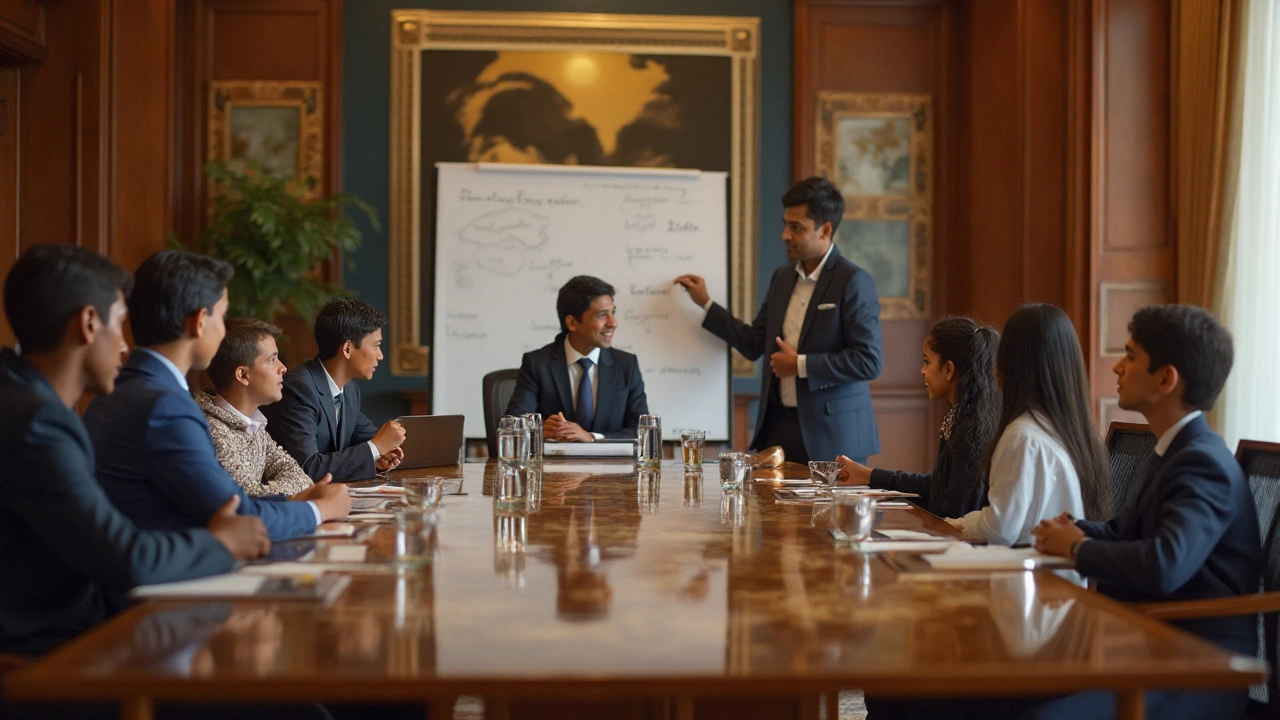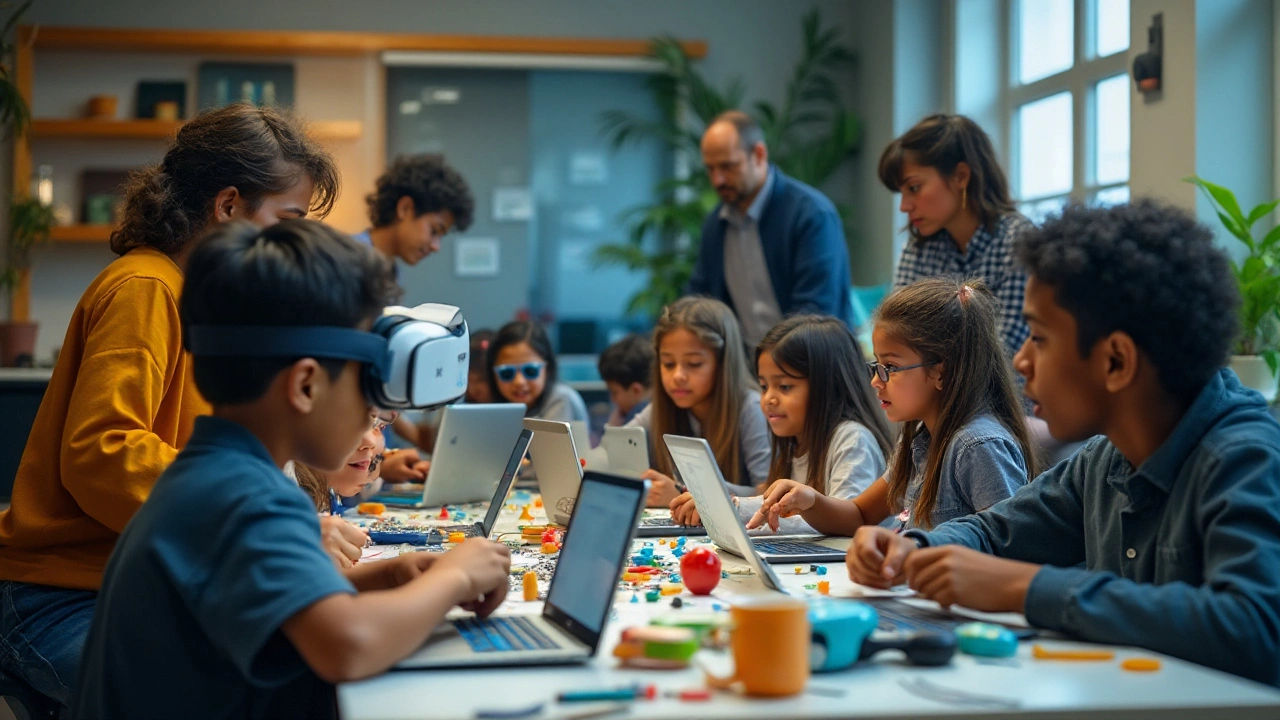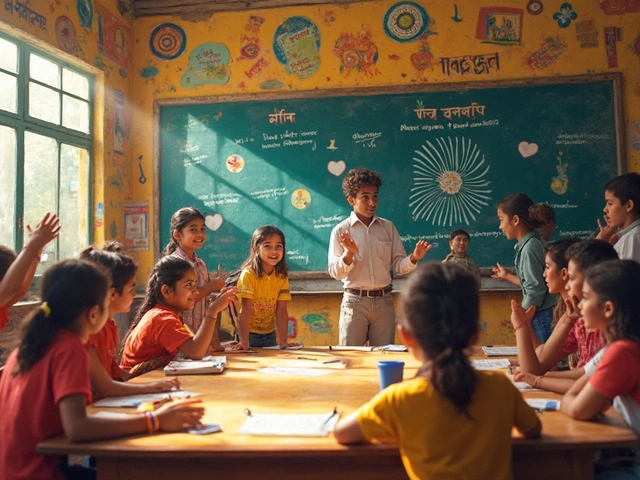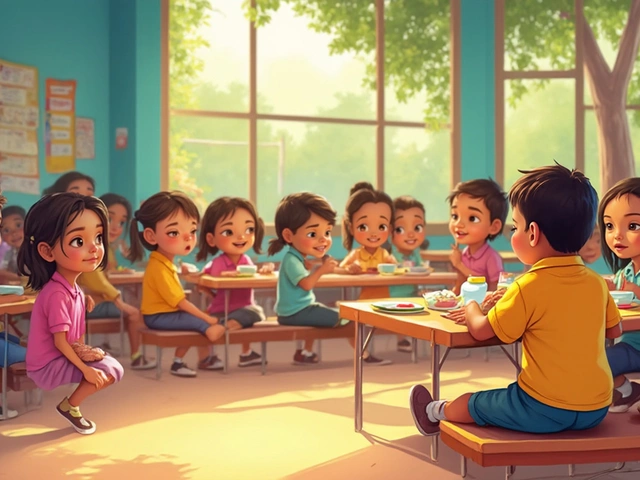In today's world, after-school clubs have evolved into vital components of a child's educational journey, particularly for those from affluent families. These programs extend beyond conventional academics, offering a comprehensive suite of skills that nurture well-rounded personalities.
From leadership to business insights, rich kids gain access to a plethora of learning opportunities through these clubs. They aren't just participating in activities; they're being groomed for a future filled with potential.
Join us as we explore the diverse lessons and skills cultivated in the after-school clubs attended by wealthy children, and how these experiences shape their worldview and future paths.
- Understanding the Unique Offerings
- Life Skills Beyond the Classroom
- The Role of Wealth in Education Choices
- The Business and Entrepreneurship Angle
- Balancing Social Etiquette and Networking
- Implications for Broader Educational Trends
Understanding the Unique Offerings
In the landscape of after-school clubs available to rich kids, the breadth of programs offered is nothing short of remarkable. These clubs provide more than just a reprieve from everyday academics; they serve as a microcosm of potential ambitions and future pathways. Picture a setting where a child can learn coding through hands-on robotics projects while simultaneously developing public speaking skills in a debate club. This dual approach signifies a move beyond traditional teaching methods, laying a groundwork for nuanced understanding and practical application of knowledge. Children engage in hands-on learning experiences, a trend driven by the desire to produce innovators and thinkers rather than mere recollectors of information. Such environments often employ seasoned professionals and industry veterans who offer real-world insights, enhancing the learning experience.
Many of these after-school clubs emphasize a multidimensional learning approach, encouraging participation in areas as varied as environmental conservation projects and digital marketing campaigns. For instance, it is not uncommon for these clubs to collaborate with corporations or universities, providing children access to resources and expertise not readily available in a standard school curriculum. The emphasis on experiential learning is evident in initiatives like 'Junior CEO Entrepreneurs,' where students not only devise business models but also pitch their ideas to actual investors, afording a taste of entrepreneurial dynamics. Meanwhile, arts and design enthusiasts might find themselves working on joint projects with artists in residence, crafting a fusion of creativity and conception.
"Exposure to diverse experiences in childhood prepares our youth to wield influence as considerate leaders rather than passive inheritors," mentions Dr. Lisa Collins, an eminent child psychologist, highlighting the transformational potential of these exceptional programs.
The wealth factor undoubtedly broadens the scope of what can be offered and how it is delivered. Beyond logistical support, there is often a willingness to innovate and adopt state-of-the-art teaching aids. Consider an after-school club that includes virtual reality for geography lessons or cybersecurity challenges in partnership with tech firms. The opportunities these clubs present are as varied as they are prestigious, providing rich kids with a fertile ground to nurture their latent talents and acquired skills. Such educational variety fosters flexibility and adaptability, traits that are increasingly essential in our rapidly evolving world. It is in these enriched educational nests that tomorrow's leaders and inventors are being incubated, perched on the precipice of groundbreaking advancements.
Life Skills Beyond the Classroom
When exploring the realm of after-school clubs that cater to rich kids, it becomes evident that these programs offer more than just extracurricular activities. A significant focus is placed on nurturing life skills that will serve these children well into adulthood. Among such skills is an emphasis on cultural appreciation, an often overlooked yet essential component of a well-rounded education. Through exposure to various art forms, foreign languages, and global traditions, children broaden their perspectives, allowing them to engage confidently with diverse communities. This understanding is crucial in today's interconnected world where cross-cultural communication is a valuable asset.
Leadership and teamwork are pivotal skills that many after-school clubs emphasize. Through engaging in group projects and managing small initiatives, children learn the nuances of working within a team. They develop competencies in delegation, collaboration, and conflict resolution. These clubs often simulate real situations, wherein students might run a mock business or manage a charity drive. By doing so, they learn how to negotiate and compromise, traits that are indispensable in both personal and professional realms.
Critical thinking and problem-solving are diligently honed through interactive learning experiences designed to challenge students' mental faculties. Consider, for instance, the chess and debate clubs which are popular among this demographic. By strategizing to win a chess match or articulating arguments in a debate, children exercise foresight and analytical prowess. They are encouraged to think multiple steps ahead, understand the domino effects of their decisions, and critically assess their performance to improve continually. These mental exercises cultivate resilience and an aptitude for innovative thinking, which are critical in navigating complex, unpredictable environments.
The cultivation of empathy and emotional intelligence cannot be overlooked when discussing life skills. After-school programs frequently incorporate community service projects where children engage directly with societal issues. In doing so, they learn to see beyond their privileged bubbles, understanding and appreciating the diverse challenges faced by people from different walks of life. Such experiences teach the importance of compassion and social responsibility, qualities that shape conscientious individuals who contribute positively to society.
In a world that increasingly values soft skills, these programs ensure that children are not just book-smart but socially adept and emotionally resilient. According to educational psychologist Dr. Lauren Schmidt, "Life skills form the backbone of a child's future interactions and successes. It's through experiences that embody these skills that children truly learn to thrive." With such a holistic approach, after-school clubs become a crucible of growth, crafting individuals who are ready to meet tomorrow's challenges with agility and grace.
| Life Skill | Percentage of Parents Noting Improvement |
|---|---|
| Leadership and Teamwork | 75% |
| Critical Thinking | 68% |
| Empathy and Emotional Intelligence | 82% |

The Role of Wealth in Education Choices
The intersection of wealth and education decisions is as multifaceted as it is impactful. Being in a position where financial constraints do not limit options means that children from affluent families can participate in a variety of enriching after-school clubs. These programs are often tailor-made to cultivate specific skills and interests, such as coding, public speaking, or even performing arts, that can significantly influence a child’s personal and professional trajectory.
When exploring the role of rich kids in this context, it's pivotal to consider how wealth opens the doors to prestigious private institutions. These schools typically offer a broader spectrum of extracurricular activities compared to public schools, allowing students to delve into niche areas such as robotics, debate, and advanced scientific research. According to Forbes, "The access to exclusive educational resources not only provides immediate benefits but also cultivates long-term advantages in higher education pursuits and career opportunities.”
These opportunities can be seen through the facilities provided in many wealthy institutions, showcasing advanced equipment and resources. From high-tech laboratories to finely equipped art studios, the sheer range of choices is staggering. Having access to such diverse and state-of-the-art amenities allows these children to explore potential passions and cultivate them in a way that might not be feasible in less well-funded settings.
Wealth also influences the caliber of mentors and educators that children are exposed to. Professionals who are leaders in their fields often moonlight as teachers or coaches in these institutions, providing kids with insights far beyond textbook knowledge. Such exposure can be instrumental in fostering a deeper understanding and genuine interest in various subjects. Moreover, parents who are financially well-off are more likely to prioritize and invest in additional educational tutoring or expert coaching for their kids, further solidifying their learning experiences.
The ripple effects of such privileged educational choices are far-reaching, impacting not just academic prowess but also critical life skills like networking and presentation. While access to these resources can widen the gap between socioeconomic classes, it also pushes the limits of what educational opportunities can offer. It's these very choices that pave the way for many children from affluent backgrounds to become future leaders and innovators, carrying forward the advantage of their rich educational foundations. In essence, wealth plays an undeniable role in shaping the educational landscape for these children, setting them on paths perhaps less accessible to others.
The Business and Entrepreneurship Angle
For many children from affluent backgrounds, the concept of entrepreneurship isn't just an abstract idea parked for their future. It's something they engage with actively through after-school clubs specifically catered to nurturing the next generation of business leaders. These clubs, often embedded within elite academic institutions, are designed to mirror the foundational principles of entrepreneurship and commerce, providing a solid platform for curious minds. The clubs often partner with established entrepreneurs who act as mentors, guiding these young minds through the maze of starting and managing businesses. Rich kids don't just develop theoretical knowledge; they witness firsthand what it means to balance innovation with effective operational strategies.
These children have the unique advantage of exposure to real-world business scenarios at an early age. A report by the Global Entrepreneurship Monitor notes that early exposure to business activities significantly increases the likelihood of entrepreneurial endeavors in adulthood. This formative experience is both transformative and deeply engaging for the kids, nurturing their problem-solving skills and encouraging a mindset that thrives on innovation. The entrepreneurs they meet often share stories of success and failure, cultivating resilience and the ability to learn from mistakes.
One of the interesting aspects here is the introduction of experiential learning. Many programs have adopted hands-on activities such as business simulations and development projects that give students a taste of the challenges faced in real enterprises. These activities are not just about inciting interest but are structured to impart essential skills in financial literacy and management. A fascinating study by the National Bureau of Economic Research found that students who engage in business clubs are more likely to pursue careers in business-related fields, attributing a portion of their success to early exposure and education. Whether it's a miniature version of the stock market or a simulated pitch to potential investors, the depth of their learning is enhanced by the multi-sensory experiences these clubs provide.
“
Financial literacy opens up a child's ability to recognize opportunities and make informed decisions that can dramatically affect their personal and professional lives,”states Ashley Feinstein Gerstley, author of The 30-Day Money Cleanse. Indeed, these after-school programs strive to impart not just business acumen but also the foresight necessary for strategic decision-making. Students gain familiarity with profit and loss statements, understand market trends, and even dabble in the basics of coding to keep up with technology-driven business models. The aim is not just to teach them how to succeed but also how to innovate at every stage.
In this atmosphere, networking becomes an invaluable component. Students are encouraged to connect with peers, mentors, and even family members to build a supportive community for their projects. Rich kids learn early on that entrepreneurship is not a solitary endeavor but one that thrives on collaboration and the exchange of ideas. This skill of building a network and leveraging it effectively can be the cornerstone of future business successes in their adult lives. The emphasis on connections is often seen as a cornerstone for success in entrepreneurial ventures. Ultimately, these lessons create not just potential entrepreneurs but socially responsible individuals who are keenly aware of the impact their innovations can have on society at large.

Balancing Social Etiquette and Networking
In the realm of after-school programs for affluent children, social etiquette and networking play a crucial role in shaping future leaders. These activities offer more than mere academic achievements; they emphasize understanding social dynamics and the art of making lasting connections. For instance, etiquette classes may teach children how to conduct themselves in formal settings, understanding cultural norms, and developing conversational skills that instill confidence.
Yet, it's not just about attending sessions on politeness. Networking opportunities abound in these environments, giving rich kids a chance to learn from mentors, industry leaders, and even peers from diverse backgrounds. These interactions broaden their perspective, encouraging them to think critically about the global landscape. Knowing how to engage with different personalities helps these children foster meaningful relationships that often lead to future collaborations and opportunities.
One notable program includes a business mentorship segment where children are paired with executives who guide them through small projects. This direct exposure to ambitious professionals offers practical insights into the corporate world, setting a foundation for entrepreneurial pursuits later in life. Quoting an influential figure like Warren Buffet can be impactful:
"The power of networking is not about collecting contacts. It's about planting relationships."
Developing these skills early on is invaluable, as they equip children to navigate diverse social environments. Programs often conduct mock interviews, debate competitions, and public speaking sessions, all designed to polish their social prowess and prepare them for real-world interactions. Crucially, these sessions also highlight the importance of empathy, integrity, and respect, reflecting a rounded approach to interpersonal skills.
To quantify its impact, a recent study from the International Youth Foundation indicated that children involved in structured social etiquette and networking clubs displayed a 35% improvement in confidence levels. This confidence transcends into other life aspects, encouraging a proactive and engaging stance in various situations. A simple table from the survey like this can be insightful:
| Activity | Confidence Improvement |
|---|---|
| Mock Interviews | 20% |
| Debate Competitions | 15% |
| Public Speaking Sessions | 25% |
Clearly, these programs provide more than just access to an elite network; they serve as platforms for nurturing the foundational skills needed for future success in any realm they choose to pursue.
Implications for Broader Educational Trends
The insights gained from after-school clubs attended by rich kids paint a compelling picture of evolving educational landscapes. With their ability to access diverse learning experiences, these children often come away with skills that stretch far beyond traditional classroom walls. This evolving approach to education reflects a shift towards holistic development, paying close attention to social, emotional, and practical skill sets that prepare young individuals for real-world challenges.
As these clubs introduce children to critical thinking, leadership, and creative problem-solving, they indirectly highlight the gaps in conventional school systems. While regular curriculum focuses heavily on academics, the rich are learning teamwork, negotiation, and digital literacy, often seen as key future-ready skills. This duality raises important questions about equality in education. Are children from less privileged backgrounds being adequately prepared? Is the divide in educational opportunities widening? Some educators argue that what is considered extracurricular today may become essential tomorrow, making it imperative for broader educational systems to catch up.
According to Dr. Sylvia Brown, an educational researcher at the University of Oxford, "We see a growing emphasis on 21st-century skills in these elite environments. There's a stark need to democratize access so that these skills are universal, not just a privilege."
Data from a 2023 survey highlights this disparity. It shows that 60% of affluent families enrolled their children in programs focusing on emerging technologies and global citizenship. In contrast, less than 25% of middle-income families had access to such facilities. This statistical reality is shaping dialogues around equality and accessibility in education, demanding systemic changes.
The challenge lies in mainstream educational bodies recognizing and integrating these learnings. While private institutions cater to rich kids with tailored programs, public schools are grappling with budget constraints and standardized curriculums. Both ends must work together, perhaps adopting a hybrid model that elevates regular schooling by incorporating life skills as core components of the education process.
On a hopeful note, initiatives are being rolled out in parts of Europe and Asia where pilot projects integrate such modules into the public school framework. They aim to reduce the inequality gulf by providing all children with access to practical, diversified learning experiences. The success and scalability of such efforts could very well determine the future trajectory of educational trends across the globe.








